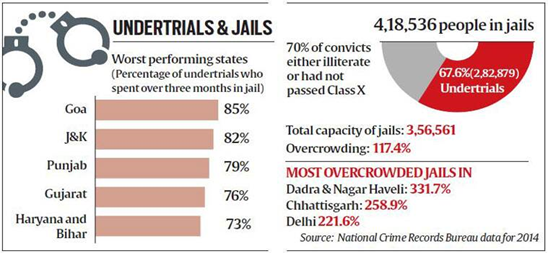

1st November 2022 (7 Topics)
Context
Recently, the Supreme Court (SC) decided to examine a petition challenging a provision in the election law that imposes a blanket ban on under trials, persons confined in civil prisons, and convicts serving their sentence in jails were deprived of their right to vote.
Background
- The latest National Crime Reports Bureau (NCRB) report of 2021 shows that a total of 5, 54,034 prisoners were confined as on December 31, 2021, in various jails across the country.
- A hike of 9%. Uttar Pradesh has the maximum number of under trials (21.2%, 90,606 under trials) in the country followed by Bihar (13.9%, 59,577 under trials) and Maharashtra (7.4%, 31,752 under trials) at the end of the year 2021.
- This growing number of under-trials and conviction rates leads to keeping a large section of society away from their right to cast their votes over a longer period of time.

About
Provisions related to Prisoners’ right to cast their vote:
- The right to vote is a constitutional right under Article 326 of the Constitution.
- Under Section 62(5) of the Representation of the People Act, 1951, individuals in the lawful custody of the police and those serving a sentence of imprisonment after conviction cannot vote. Undertrial prisoners are also excluded from participating in elections even if their names are on the electoral rolls.
- Only those under preventive detention can cast their vote through postal ballots.
Why undertrials should be given voting rights?
- The present voting ban is criticized on the ground that it makes no offense-based or sentence-based classification — that is, prisoners are debarred from voting irrespective of the gravity of the offense they have committed, or the length of their sentence.
- It also makes no distinction between convicted prisoners, undertrials, and those in lawful police custody.
- Besides, a person is innocent until proven guilty by the law. Despite this, it denies an undertrial the right to vote but allows a detainee the same.
- The provision also violates the rights to equality, and votes (Article 326) and is arbitrary. It is not a reasonable restriction.
What are the concerns associated?
- Denial of Rights to people for un-proven convictions: Denying the right to vote does not comply with the requirements for legitimate punishment.
- Lack of any Classification against the nature of Crime: The ban to vote, lacks reasonable classification based on the nature of the crime or duration of the sentence imposed unlike in countries like South Africa, the United Kingdom, France, Germany, Greece, Canada, etc.
- This lack of classification is anathema to the fundamental right to equality under Article 14 (right to equality).
- Discrimination: It has been seen that a convicted person can vote if she is out on bail, whereas the same right is denied to an under trial who is not yet found guilty of a crime by a court of law.


